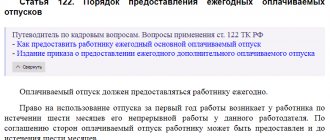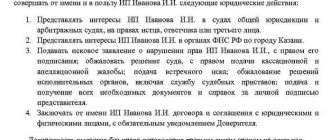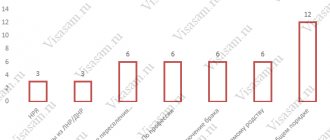First, let’s remember what the general procedure for “seeing off” an employee on vacation consists of.
- Drawing up a vacation schedule for the next calendar year (Article 123 of the Labor Code of the Russian Federation).
- Familiarization of employees with the vacation schedule against signature (Part 2 of Article 22 of the Labor Code of the Russian Federation).
- Notifying the employee against signature of the start of vacation no later than two weeks before its start (Part 3 of Article 123 of the Labor Code of the Russian Federation).
- Issuing an order to grant leave to an employee during the period established by the leave schedule (Part 2 of Article 123 of the Labor Code of the Russian Federation).
From the start date of the vacation established in the order, the necessary codes should be entered in the working time sheet:
- “FROM” or “09” – if the employee is on annual basic paid leave;
- “OD” or “10” – if the employee is on annual additional paid leave.
Please note that the Labor Code does not give an employee the right not to take his/her allotted leave. Taking annual paid leave is not only the right, but also the duty of the employee.
Emergence of the right to leave
A newly hired person can take annual leave only after six months of continuous work with a new employer (Article 122 of the Labor Code of the Russian Federation), although deviations from this rule are possible. The occurrence of deviations is caused by the presence of:
- circumstances obliging the employer to release the employee on vacation at a time convenient for him (including ahead of schedule);
- mutual consent of the parties to the employment contract for the early provision of rest time.
Going on vacation in subsequent years is in no way connected with the mandatory work of any period of time from the period for which annual vacation is provided (Article 122 of the Labor Code of the Russian Federation). That is, vacation can always be obtained in advance (including in the first year of work). In the future, the employee will either have to work the period for which he received vacation, or overpaid vacation pay will be withheld from his income upon dismissal (Article 137 of the Labor Code of the Russian Federation).
The employer will add information about the period of time intended for the employee’s vacation in the year of his employment to the vacation schedule approved by him before the current year. And this schedule will be observed unless the employee has circumstances due to which he can ask for a postponement of rest time.
How are vacation pay calculated?
For each day of vacation, including those that fall on weekends, you are paid the average salary. To calculate the Labor Code of the Russian Federation Article 139. Calculation of the average salary, you need to divide the amount of wages accrued over the last 12 months by 12 and then by 29.3 - the average number of days in a month. Salary in calculations is taken into account with bonuses, allowances, and additional payments for overtime.
Let's say you are going on vacation on August 1, and before that you were on vacation in June last year. Moreover, until January 1 you received 44 thousand a month, from January 1 - 50 thousand, in March you were given a bonus of 5 thousand rubles. Then the calculations look like this:
(5 × 44 + 7 × 50 + 5) / 12 / 29.3 = 1.63 thousand rubles
Accordingly, if you are going on vacation for 10 days, then they will give you 16.3 thousand for it.
If you went on vacation - annual and without pay - took sick leave or were released from work for another reason, these days and the money accrued for them are excluded from the calculations.
For example, in April you took a week off. To find out how many days to take into account when calculating average daily earnings in April, you need to divide 29.3 by the number of days in this month and multiply by the difference between the number of days in the month and the number of days you were not at work:
29,3 / 30 × (30 − 7) = 22,4
Accordingly, the formula for calculating average daily earnings will also change. It will change the number of working days, and vacation pay for April will be excluded from total earnings:
(5 × 44 + 6 × 50 + 30.24 + 5) / (11 × 29.3 + 22.4) = 1.61 thousand rubles
Circumstances requiring early leave
Circumstances obliging an employer to put an employee on vacation before the end of six months include (Labor Code of the Russian Federation):
- pregnancy - the provision of annual leave is linked to maternity leave and occurs immediately before or after it (Articles 122, 260);
- the employee is under 18 years of age (Articles 122, 267);
- adoption of a child (children) under the age of 3 months (Article 122);
- the fact that the husband expects his wife to give birth to a child during the period of maternity leave granted to her (Article 123);
- the presence of a disabled child under the age of 18 is important for one of the parents (guardians, trustees, foster parents) raising such a child (Article 262.1);
- the presence in a family of more than 2 children under the age of 12 years (Article 262.2);
- the fact of granting annual leave at the place of main work - for part-time workers (Article 286).
The right to grant leave at a time convenient for the employee is also enshrined in other regulations. For example, early rest time can be used by:
- spouses of military personnel (simultaneously with the leave granted to the spouse) - clause 11 of Art. 11 of the Law “On the Status of Military Personnel” dated May 27, 1998 No. 76-FZ;
- persons awarded the sign “Honorary Donor of Russia” - subclause. 1 clause 1 art. 23 of the Law “On Donation...” dated July 20, 2012 No. 125-FZ;
- persons exposed to radiation - clause 15 of Art. 2 of the Law “On Social Guarantees...” dated January 10, 2002 No. 2-FZ, paragraph 5 of Art. 14, clause 1, part 2, art. 15 of the Law “On Social Protection...” dated May 15, 1991 No. 1244-1
- disabled combatants of groups 1-2 - subp. 17 clause 1 art. 14 of the Law “On Veterans” dated January 12, 1995 No. 5-FZ;
- participants of the Second World War - subp. 13 clause 1 art. 15 of Law No. 5-FZ;
- combat veterans - sub. 11 clause 1, sub. 4 clause 2, sub. 3 p. 3 art. 16 of Law No. 5-FZ;
- military personnel of units that were not part of the active army during the Second World War, as well as military personnel awarded orders or medals for service during the Second World War - clause 9 of Art. 17 of Law No. 5-FZ;
- persons awarded the badge “Resident of besieged Leningrad” - sub. 9 clause 1 art. 18 of Law No. 5-FZ;
- persons who worked in the rear at defensive and military facilities during the Second World War - subclause. 10 p. 1 art. 19 of Law No. 5-FZ;
- Heroes of Labor (socialist and Russian Federation) and full holders of the Order of Labor Glory - clause 2 of Art. 6 of the Law “On the provision of social services...” dated 01/09/1997 No. 5-FZ;
- Heroes (USSR and Russian Federation) and full holders of the Order of Glory - clause 3 of Art. 8 of the Law “On the Status of Heroes...” dated January 15, 1993 No. 4301-1.
In other cases, the employer is not obliged, but may agree to grant early leave.
What types of holidays cannot be provided in advance?
Not all types of vacations can be taken off earlier than expected. The concept of “vacation in advance” most often refers specifically to annual vacation paid by the employer. But there are some types of leave that must have a documentary basis, so they cannot be granted in advance if the employee does not have an official document confirming this basis. Such holidays include:
- additional;
- administrative;
- training;
- maternity leave (both for childbirth and for caring for the baby).
How to go on vacation before six months are up?
The existence of circumstances giving the employee the right to use vacation at a time convenient for him may be known already at the time of his employment. In this case, the data on the rest time of such an employee is immediately entered into the vacation schedule, taking into account his wishes, and he will go on early leave as scheduled.
But relevant circumstances may arise later than the date of hiring. To change the rest period recorded in the vacation schedule after the first six months of work, the employee will need to submit an application to the employer requesting a postponement of the vacation time and explaining the reasons for which it became possible to qualify for such a transfer. The reason should be confirmed by copies of documents indicating its existence.
If the employee needs early leave for any other reason that does not oblige the employer to agree to it, then he will also have to fill out an application requesting a postponement of the rest period and indicating why this transfer is needed. However, the employer has the right in such a situation not to satisfy the employee’s request.
How many days?
Thus, it turns out that after six months of regular work with a particular employer, the employee who has been granted leave has the right to receive basic paid rest in full, namely for a total duration of twenty-eight calendar days annually. Many people are wondering whether vacation after 6 months is the right or obligation of the employer.
The Labor Code of the Russian Federation does not take into account the possibility of granting partial annual leave in kind with payment, that is, in proportion to the time worked in a particular working year. Based on this, vacation, which is considered regardless of working hours in the year, is provided in full, namely within the established duration.
Let's sum it up
- For persons newly hired, the general rule applies, according to which the right to the first annual leave arises no earlier than after six months of work. However, this rule is not always followed, since there are grounds requiring the employee to be allowed to go on vacation at any time convenient for him. And in the absence of such grounds, the employer can simply meet the employee halfway and fulfill his request for early leave.
- The grounds obliging an employee to be given leave at the time specified by him are quite varied and are contained both in the Labor Code of the Russian Federation and in a number of other laws. Most of them are associated with the expectation or presence of a child (children) in the family, as well as with services to the country.
- The right to early leave (if there are grounds) can be declared upon hiring. In this case, the new employee’s rest time will be included in the vacation schedule, taking into account his wishes. If the grounds giving the right to choose the time of rest arise later than the date of hire, then in order to change the period allotted for vacation, the employee will have to submit to the employer an application to postpone this period, indicating the reason for the postponement and confirming it with documents.
Unlock access to the private part of Clerk with a Premium subscription. Get hundreds of webinars and online courses, unlimited consultations and other proprietary content for accountants.
Hurry up to subscribe with a 20% discount until October 15, 2021. Read more about “Premium” here.
Differences between advance leave and timely leave
The conditions under which such a vacation becomes a reality differ from the usual guarantee of annual vacation in several important nuances:
- the manager has the right to refuse permission for such leave, since providing rest in advance is not his responsibility;
- vacation granted in advance cannot be replaced with monetary compensation, because these funds have not yet been earned;
- like regular leave, such leave can be divided into parts, one of which cannot be less than 2 weeks.
When do they pay and what is withheld?
The period when vacation pay and salary before vacation are paid is indicated in Article 136 of the Labor Code of the Russian Federation. The amount of vacation pay must be paid no later than three calendar days before the start of the vacation. But it is not necessary to transfer wages by the specified date. Wages must be paid according to the general rules established in the labor and collective agreement.
Determine the period in calendar days. But if the specified period includes weekends or holidays, then issue a vacation calculation in advance. That is, the day before (Letter of Rostrud dated July 30, 2014 No. 1693-6-1). For example, an employee goes on vacation on Monday. Pay your vacation pay on the previous Thursday. In this case, GIT inspectors will not be able to accuse the employer of violating the provisions of Art. 136 Labor Code of the Russian Federation.
IMPORTANT!
If vacation pay is accrued in favor of civil servants, then the salary for the vacation must be paid no later than 10 calendar days before its start date (Part 10, Article 46 of Law No. 79-FZ of July 27, 2004). For municipal employees, deadlines are established by regional and local legislation.
Do I need to pay salary along with vacation pay? No, but it's possible. If you still decide to pay, then check the requirement of Art. 136 of the Labor Code of the Russian Federation, so that earnings are transferred to employees at least every half month. Otherwise, administrative penalties may be applied to the employer under Art. 5.27 Code of Administrative Offenses of the Russian Federation.
Withhold personal income tax from the accrued amount for vacation in the same way as from wages. The deadline for transferring income tax on vacation and sick leave is no later than the last day of the month in which the income was paid. Calculate insurance premiums in the general manner. Insurance coverage must be paid to the Federal Tax Service and the Social Insurance Fund before the 15th day of the month following the reporting month.
Where are the vacation pay rules written?
Everyone who works under employment contracts, agreements and contracts is provided with guaranteed rest time.
The minimum duration is 28 days. But only for a fully worked calendar year. But employees who are signed under GPC, author’s order and contract agreements are not entitled to paid leave. Essentially, vacation is paid time off. Moreover, the procedure and principles of payment are fixed at the legislative level:
- Chapter 19 of the Labor Code of the Russian Federation - regarding duration, payment terms, job retention. The standard contains provisions on both main labor and additional leaves.
- Decree of the Government of the Russian Federation dated December 24, 2007 No. 922 (as amended on December 10, 2016) - regarding the calculation of average earnings.
- Letter of the Ministry of Labor dated April 15, 2016 No. 14-1/B-351 - regarding the determination of indicators of actual time worked in case of deviations from the standard regime.
Legislative acts and departmental letters of recommendation establish only general provisions for the provision of rest. Specific values, payment procedures and other factors are established individually by the organization. The standards must be specified in the employment contract with the employee, in the collective agreement, as well as in other local regulations of the institution.
Is it obligatory?
Yes, he is obliged to do so if the employee approaches him with a corresponding application. In general situations, upon completion of six months of work, the employee has a legal right to receive leave, and the employer has a direct obligation to provide it. At the same time, when sending an employee on vacation, both parties are obliged, among other things, to take into account each other’s mutual capabilities and interests, and they should also mutually agree on the start date of the vacation period.
We looked at what vacation after 6 months is - a right or an obligation.
But how to pay for it?
So, Article No. 122 of the Labor Code of the Russian Federation talks about the annual provision of paid leave after 6 months; the employer has absolutely no reason to pay only for part of such rest, which is fourteen calendar days. In such a situation, the boss undertakes to pay all twenty-eight days that fall during the period of the employee’s annual basic leave with subsequent payment. All calculations for average earnings, which are saved during the rest period, are calculated in accordance with the rules established in Article No. 139 of the Labor Code, in particular the provision of various features in the procedure for calculating the average salary.






